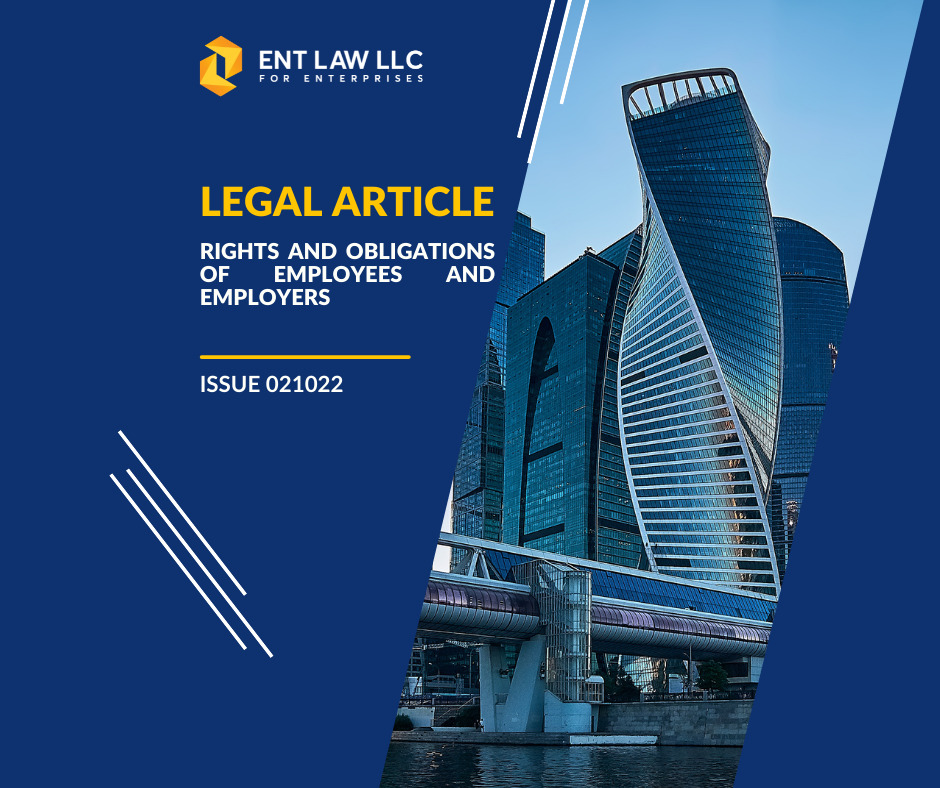Dear Valued Clients,
1. For employees
Employees mean person who works for an employer under an agreement, are paid, managed and supervised by the employer[1].
According to the Article 5 of the 2019 Labor Code, employees have the rights and obligations as follows:
a) Employees’ rights
- Work; freedom of choice of employment, workplace or occupation; participate in basic and advanced occupational training; develop professional skills; suffer no discrimination, forced labor and sexual harassment in the workplace;
- Receive a salary commensurate with their occupational skills on the basis of an agreement with the employer; be provided with personal protective equipment and work in an occupationally safe and healthy environment; take statutory sick leaves, annual paid leaves and receive collective welfare benefits;
- Establish, join an representative organization of employees, occupational associations and other organizations in accordance with law; request and participate in dialogues with the employer, implementation of democracy regulations and collective bargaining with the employer; receive consultancy at the workplace to protect their legitimate rights and interests; participate in management activities according to the employer’s regulations;
- Refuse to work if they finds that the work directly threatens their life or health;
- Unilaterally terminate the employment contract;
- Go on strike;
- Exercise other rights prescribed by law.
b) Employees’ obligations
- Implement the employment contract, collective bargaining agreement and other lawful agreements;
- Obey internal labor regulations, the lawful management, administration and supervision by the employer;
- Implement regulations of laws on labor, employments, vocational education, social insurance, health insurance, unemployment insurance, occupational safety and health.
2. For employers
Employer means an enterprise, agency, organization, cooperative, household or individual who employs other people under agreements. An employer that is an individual shall have full legal capacity[2].
According to the Article 6 of the 2019 Labor Code, employers have the following rights and obligations as follows:
a) Employers’ rights
- Recruit, arrange and manage and supervise employees; give commendation and take actions against violations of internal labor regulations;
- Establish, join and operate in employer representative organization, occupational associations and other organizations in accordance with law;
- Request the representative organization of employees to negotiate the conclusion of the collective bargaining agreement; participate in settlement of labor disputes and strikes; discuss with the representative organization of employees about issues related to labor relations and improvement of the material and spiritual lives of employees;
- Temporarily close the workplace;
- Exercise other rights prescribed by law.
b) Employers’ obligations
- Implement the employment contracts, collective bargaining agreement and other lawful agreements with employees; respect the honor and dignity of employees;
- Establish a mechanism for and hold dialogue with the employees and the representative organization of employees; implement the regulations on grassroots-level democracy;
- Provide basic training and advanced training in order to help employees improve their professional skills or change their occupations;
- Implement regulations of laws on labor, employments, vocational education, social insurance, health insurance, unemployment insurance, occupational safety and health; develop and implement solutions against sexual harassment in the workplace;
- Participate in development of the national occupational standards, assessment and recognition of employees’ professional skills.
We hope you find this Legal Article useful and look forward to working with you in the future.
Kind regards,
ENT Law LLC
The full version of this Legal Article can be found here.
————————————————
[1] Article 3.1 of the 2019 Labor Code.
[2] Article 3.2 of the 2019 Labor Code.



Issue 021123 – Procedures for terminating outbound investment projects
Dear Valued Clients, Over the past decade, policies to support and encourage businesses to invest abroad have been...
Nov
Issue of October 2023 – Updates on new Law on Electronic Transactions 2023
Dear Valued Clients, On November 29, 2005, the National Assembly issued the Law on Electronic Transactions No. 51/2005/QH11...
Oct
Issue of September 2023 – New points in regulations on employing foreign employees in Vietnam
Dear Valued Clients, On September 18th 2023, the Government issued Decree 70/2023/ND-CP (“Decree 70”) amending and supplementing a...
Sep
Issue 020923 – Transfer of contributed capital in multiple-member LLC
Dear Valued Clients, Transfer of contributed capital in a limited liability company (“LLC”) with multiple members is an...
Sep